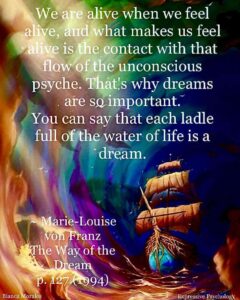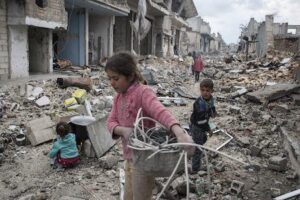 Imagine our surprise when, on our trip to Indochina last fall, our group of travelers arrived in Saigon in early December to find it decorated for Christmas! Windows of one major department store were topped with thick mounds of carved styrofoam snow. Our hotel lobby held a giant blue Christmas tree and a life-sized Santa Claus who swiveled his hips while he sang “Rockin’ Around the Christmas Tree.” When I asked our guide why a mostly Buddhist country celebrates Christmas in such a big way, he replied, “Christmas is universal now. It’s all about shopping.”
Imagine our surprise when, on our trip to Indochina last fall, our group of travelers arrived in Saigon in early December to find it decorated for Christmas! Windows of one major department store were topped with thick mounds of carved styrofoam snow. Our hotel lobby held a giant blue Christmas tree and a life-sized Santa Claus who swiveled his hips while he sang “Rockin’ Around the Christmas Tree.” When I asked our guide why a mostly Buddhist country celebrates Christmas in such a big way, he replied, “Christmas is universal now. It’s all about shopping.”
That’s pretty much what it’s about for many Westerners too, along with decorating our homes, reuniting with loved ones, preparing special foods and exchanging gifts. Amidst all the bustle I wonder how many of us actually experience the love, joy and peace that is the promise of Christmas, or profoundly connect with its underlying meaning. And what is that meaning? To understand it we need the symbolic language of mythos.
The Christmas story takes place in a stable filled with animals at the Winter Solstice, the darkest time of year. Throughout the world, a common association for the symbol of darkness is our own instinctual animal nature and all the ignorance, chaos, and moral irresponsibility that goes with it. Psychologically, this setting is a reference to unconsciousness, the state in which we all begin our lives and often end them as well.
The plot centers around a virgin who gives birth to a baby boy. Virgins and babies symbolize innocence and the abundance of undeveloped possibilities, like the pure state of a soul ready to receive Spirit. Birth represents new life with its potential for growth. And is there significance in the fact that the baby is a boy? Yes. Mary, like the Hindu goddess Durga, symbolizes the feminine source of all energy, and Jesus represents an extraordinarily hopeful new masculine form of ego-life that has manifested from the maternal matrix. From a psychological perspective, the significance of Jesus is that 2,000 years ago he introduced into the Middle-Eastern world an unprecedented (for that place and time) new capacity for a deeply personal, intimate experience of the Great Mystery of life.
At the end of the story three (the number of forward movement that overcomes duality) kings (the masculine principle, sovereignty, and worldly power) arrive after a long and arduous trek from the Far East. Guided by a star, (stars are attributes of all Queens of Heaven and represent the highest attainment, the presence of divinity, hope and light), they bring rare and precious gifts for the tiny baby. The kings symbolize the hard work of individuation and the religious outlook of unified consciousness it brings. This way of being sees the sacredness in everything and reveres every form of life down to the smallest and seemingly least important. Finally, the word Christ is a translation from the Hebrew word messiah. A messiah is a redeemer, someone who will improve the state of humanity and the world.
Like the myths of every religion, the value of this story does not hinge on external fact, but psychological truth. Christ mass celebrates a momentous evolutionary leap forward in consciousness from a primitive, instinctual, self-serving survival mentality into an advanced self-awareness capable of self-control and compassionate living. The secret meaning of Christmas is this:
Like the spirit man Jesus, you and I can experience a rebirth into an expanded level of consciousness capable of improving the state of humanity and the world!
May the enlightenment of your mind be quickened during this holiday season, and may the love in your heart be abundant and overflowing. Merry Christmas.

A Lesson on Aging
I’m so happy to be back in the mountains. I love the weather, the trees, the birds, the rushing creek, the flowering bushes. The beauty.





0 Responses
Oh, goodness! This is wonderful….can you imagine this being preached from the pulpit! I surely wish it had been when I was growing up. It would have made so much for sense that the story I heard. I am not sure why symbolic translation is so terrifying to so many. Perhaps people would have to actually think about what they believe and see if it made sense to then. I am with those I love and I feel the universe of love expand around us! xoxox
Thank you, Beth! I wish I had heard it too. It would have made so many aspects of my life easier: fewer feelings of confusion and guilt when I asked difficult questions people didn’t want to answer; more awareness of the importance of listening to myself; and less cynicism about the adults in positions of authority who didn’t really seem to want to know or tell the truth about things they said were so important.
I think people fear symbolic translations because they’ve been taught to look to powerful people (outside themselves)who have pat assurances that everything will be okay if….. if we will believe certain things, do certain things, don’t do other certain things, etc. We humans are finding it very difficult to believe that every story we tell about powerful and beautiful and humble and loving and wise others is also about us.
I’m adding my love to that universe of love expanding around you during this holy-day season!
Love, Jeanie
That was beautiful, Jean.
May you have a lovely Christmas; it was been a privelege getting to know you and reading your thoughts.
xx
Thank you, Viv. Back at you! May your holy days be filled with love and joy.
Love, Jeanie
Dear Jean,
Thank you for naming the superficial, and false understanding of Christmas, but also it’s deep, rich symbolic meaning that has been SO MISSED in the world and by many who claim Christ as their savior or not. When we get caught up in literalism and the exploitation and consumption of natural resources to fill the interior void, the true meaning of Christmas has been lost. It is rather this internal mining of the symbolic yet real “Good News” of the buried treasure deep in our individual hearts and minds…and reflected in all of nature. It is there where the transformative power of God can work. We are each invited to experience giving birth to a “New Creation” of Divine consciousness which seeks to live in harmony within us and with all life around us. What greater gift than that? That’s no cheap tinsel!
What a refreshing and hope-filled post for this season of darkness moving into light! May it be so!
Thank you, Julie.
I love your description of the “Good News” as speaking to “the buried treasure deep in our individual hearts and minds…and reflected in all of nature.” Yes, the life and light in us and the world is the miracle we need to celebrate during this holy season and in every precious moment!
Wishing you a joyful, light-filled holy-day!
Love, Jeanie
Loved it! Merry Christmas Jean.
Jeff
Thank you, Jeff! Merry Christmas. Jeanie
Dear Jeanie:
I read this post to Deb (my wife) and Geneva (my mother-in-law, who is a very meticulous Christian) this morning—with tears. Geneva loved it and wanted a printout; Deb thinks you are a Buddhist (a philosophy in which she is a lay teacher).
For me, it brought to mind a powerful experience of redemption, which I had at an early age. When I was 15 years old, my family took up residence in the very Japanese City of Kamakura, the home of the archetypal “Great Buddha” of Japan, built of bronze in 1252. This was 1962, just 17 years after WWII, at a time when the Cathedral of Yokohama was still in rubble. Indeed, at the end of WWII, the only building left standing in Yokohama was a stucco hospital, complete with ramps between floors for the gurneys, which was to become my high school building.
On our third week in Kamakura, which might as well have been on the other side of the Moon from the American Navy enclaves of Yokosuka and Yokohama, I decided to go to a dance at the American “Teen Club” in Yokohama. It was a 30-minute train ride to Yokohama, and another 20-minute trolley ride to the American housing area.
I knew I had to catch the last train back to Kamakura from Yokohama Station about 11:00 p.m. I went to the correct platform and boarded the first train that came along in the Kamakura direction. About 20 minutes later we came into Ofuna, much to my relief, confirming I was going in the right direction. On a hill above Ofuna Station, there is a huge white statue of a woman in a white robe and veil, known as the Ofuna Kanon (we called her “The Goddess of Mercy”—she is the female manifestation of Avalokiteshvara, the Bodhisattva of Compassison). She was always lighted at night, and visible for miles around, and she always brought peace to my soul.
There was just one problem. The train then gained tremendous speed and did not stop for 2 hours. I had caught the express on the main line of the Tokkaido line to Osaka, rather than the local Yokosuka line train to Kamakura. At 2:00 a.m. the train stopped for the first time, and I chose to disembark rather than continue farther from home. I must have been at least 60-70 miles from Kamakura; there was only one bare light bulb on the platform, and one tired and lonely trainman on the platform. I asked him with hand and arm signals when the next train was back toward Yokohama. He only said, “Owari” [Finished], and left the platform to go off duty.
So there I was, 15 years old, on a dark platform, having been raised on movies like Guadalcanal Diary and Thirty Seconds Over Tokyo. To say I was apprehensive would be putting it mildly—I’m sure I must have said a prayer. After a few minutes, a rickety taxi drove by and I hailed him. When I told the driver I wanted to go to Kamakura, he looked at me like I was out of my mind, but shrugged and drove off. We drove for what seemed like an eternity, on a very dark road along the sea. Finally I could see the lighthouse of Enoshima [site of the 1964 Sailing Olympics] in the distance, and I knew I must be getting near Kamakura.
At 4:30 a.m. we arrived in the City of Kamakura, and from there I was able to direct the driver to my home. The charge was 1350 Yen, about $4.00 in those days. When my sleepy Father came to the door, he only had 400 Yen, so he gave the driver a carton of cigarettes and $5 in military payment certificates (the military funny money we were not allowed to give Japanese nationals). The driver bowed very low and left.
In the early 1980s, when we had my two eldest daughters in Japan (aged 6 and 4), we used to let them come home on the subway alone from Sacred Heart International School’s kindergarten in central Tokyo. It is still possible to do this in Japan. You see, the Japanese have redeemed themselves from their dark night.
In these days I wonder whether my fellow Americans will allow for the redemption of the Muslim world. After a decade of outrageously inaccurate propaganda about the Muslim world in general, can we accept that Muslims, too, have loving family lives, and the vast majority want exactly the same things we all want—to live in peace, raise our children, have a meaningful life, and die with dignity? Americans have started to see a little bit of their aspirations for Freedom and normalcy thanks to the Arab Spring, but will we give the Muslim world the benefit of the doubt? In the end we must, but the question really is whether our politics will allow it in a few years or a century.
We need to find redemption too. When I traveled often to Pakistan in the 1990s, about 3% of the Pakistani population hated Americans. Now the number is more like 90%, and there have been similar changes in attitudes in many other Muslim countries. Fortunately, social networking has given us the chance to see the humanity in all human beings, and to convince them of the goodwill of the American people once again. I pray that all who read this will rededicate themselves to finding peaceful solutions to our problems, and to both finding redemption and allowing for redemption in others.
Merry Christmas!
Best regards, Skip
Dear Skip,
This is such a touching story, and the lesson of redemption — both the giving and receiving of it — that you draw from it is profoundly wise. In a lovely synchronicity, I was discussing my concern about the stereotyping of Muslims with my husband over breakfast this morning. It saddens me deeply to know people who hate other religions for the crimes against humanity of a few fanatical extremists, but overlook the same or similar crimes in the history of their own religions and actions to maintain their belief in their superiority. I think there will probably always be people who can’t see past the enemy “out there” to catch a glimpse of the enemy “in here,” thereby missing the chance to experience their own redemption; but I believe it is realistic to hope that someday enough people will understand and experience the true meaning of Christmas to bring about peace on a global scale. Like you, this is my prayer for the new year!
Merry Christmas to you and your family.
Jeanie
Dear Jeanie,
Allow me to share two images with your readers. The first is the “Great Buddha” (Daibutsu) of Kamakura, which was about a mile from my home when I was in high school, and which I have visited throughout my life. When it was built in 1252, it was surrounded by a major temple (like its counterpart in Nara), but in 1498 a massive tsunami came and washed the temple away, leaving the bronze image exposed to the elements ever since. That tsunami must have been even more massive than the 2011 version, since this image is on a hill about 2-300 feet above sea level.
The second image is the Ofuna Kannon, which I mentioned in the story above. In my high school years I saw this every evening, lighted in the dark. It always gave me great comfort (in a spiritual sense).
Daibutsu: http://upload.wikimedia.org/wikipedia/commons/5/5d/Kamakura_Budda_Daibutsu_front_1885.jpg
Ofuna Kannon: http://en.wikipedia.org/wiki/Ōfuna_Kannon
Best regards, Skip
I agree with the above commentator.
Love, Donna
Hi Donna,
Me too! You might be interested in checking out the kind of work he’s doing at http://www.archetypeinaction.com
I love your beautiful Christmas card! Much love to you and your family.
Jeanie
I loved you symbolic meaning of the birth of Christ. For me there is so much to take in. I need to do more readings of it. So, I am printing it out and putting it by my bed. Thanks for your posts. They are helping me grasp what I feel eludes me, symbolic language, because your explanations of the symbols are clear to me.
Dear Jazzminey,
May I recommend a book to you and all my readers who find themselves in the place you describe: where you feel the truth in symbolic language deep in your heart but don’t quite grasp it yet with your mind? I’m just finishing one of the most brilliant and healing books I have ever read about the symbolic way of thinking that helps us understand the underlying truths of every religion. It’s called “The Story of Q” and is written by N.M. Freeman. It’s a fictional account of four spiritual seekers and is inspired by actual historical events. It’s about truth, the journey of the soul, and the evolution of the self. I have read few books in my life that I could recommend more wholeheartedly than this one. You can visit the author’s site at http://www.nmfreeman.wordpress.com and see more about the book at http://www.thestoryofQ.com
I hope you’ll check it out. And please let me know your response to it if you do.
With much fondness for a sister seeker,
Jeanie